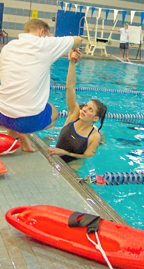 |
||
|
||
Looking for the Right StuffFor summer Beach Patrol, ‘it takes a lot to get a person on the stand.’by Ben MillerPhotos by Cathy Conway Miller
It’s a life-changing job — if you can get it. The 200-person Ocean City Beach Patrol sought 50 to 60 new members this season. Competition for that job brought summer to Annapolis in early March as 11 young men and women tried out at the Arundel Olympic Swim Center to be surf rescue technicians — lifeguards as we used to call them — with the Ocean City Beach Patrol. It was a tough day. The fittest candidates qualified by running 400 meters and swimming 500 m As the aspirants showed their stuff, some 15 Ocean City Beach Patrol lifeguards watched. “Everything you do today is being evaluated. You are proving yourself to us,” Capt. Melbourne ‘Butch’ Arbin, of La Plata, told the candidates. We are deciding, “whether we want to work with you.” Men and women who pass the tests each year to keep their own jobs judged the would-be’s not only on what they did but also on how they did it. The beach patrol wants people who will persevere to “push through the test,” said Arbin, who first passed the same test 34 years ago. The beach patrol wants people who show up on time, good team players, people who understand people. The testing is rigorous for a reason. The beach patrol wants people they can rely on no matter what. At the beach, “the last rescue of the day can be the most grueling,” said Sgt. Jamie Falcon, who lives in Annapolis and teaches at Northeast High School and Anne Arundel Community College. To rule the beach as surf rescue technicians, men and women must meet the same standard of fitness and competence. At Arundel Swim Center, six failed to make the qualifying times for the run and swim. After two hours of running and swimming, the remaining five faced the toughest test. They had to rescue a panicking swimmer. First the patrol taught the candidates the rescue procedures. Then they took turns drowning. They flailed, grabbed at their rescuers, pushed them underwater. They didn’t cut any breaks. The rescuers had to immobilize the terror-stricken actors and swim them to the side of the pool. Four or five times they had to do it. Four passed the test and got their jobs. The Beach Patrol requires no additional certification. Ocean rescue is a special skill. Just as the Navy or Marines takes raw recruits and teaches them what they need to know, the Beach Patrol trains its new guards at its own academy in Ocean City. Graduates of that eight-day course continue on supervised probation for three weeks. Getting this job isn’t easy, but it is “life changing,” according to Sgt. Brent Weingard, testing coordinator in Annapolis. Lifeguards are physically active, on display among people in a patrol that works like a family. Lifeguards have met their husbands and wives in the beach patrol. They’ve made lifelong friendships. They’ve changed careers, often choosing jobs in education so they could spend their summers working at Ocean City. In 2005, surf rescue technicians at Ocean City made 4,766 rescues, most of people caught in rip currents. But these lifeguards do more than save lives. On the beach, they teach vacationers to be safe swimmers. They warn them of dangers. They locate lost children. They scan the sea for potential victims. They deal with distractions. “It takes a lot to get that person on the stand,” says Arbin. Through the days of summer, from Memorial Day into September, nearly four million beach lovers take all that for granted. See www.town.ocean-city.md.us/ocbp for future evaluations. |
||
|
|
||
|
© COPYRIGHT 2004 by New Bay Enterprises, Inc. All rights reserved. |


 eters against time. Those who made the cut — and not all did — next proved they could swim and run with a rescue buoy, drag a 300-pound lifeguard stand, carry an unconscious man and rescue a panicked swimmer.
eters against time. Those who made the cut — and not all did — next proved they could swim and run with a rescue buoy, drag a 300-pound lifeguard stand, carry an unconscious man and rescue a panicked swimmer.